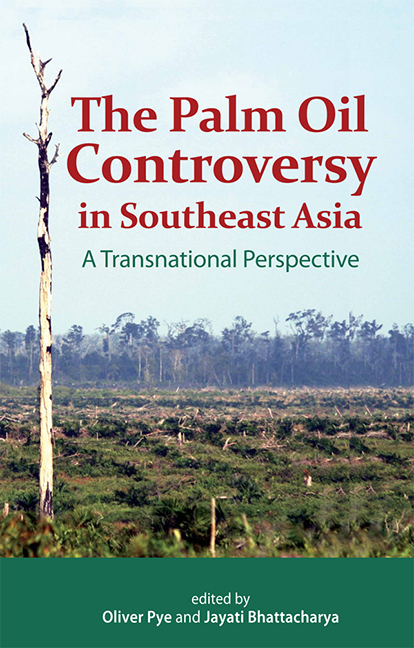Book contents
- Frontmatter
- Contents
- Foreword
- Preface
- Contributors
- Abbreviations
- 1 Introduction
- 2 Malaysian Corporations as Strategic Players in Southeast Asia's Palm Oil Industry
- 3 The Political Ecology of the Indonesian Palm Oil Industry
- 4 Evolutionary Change in the Oil Palm Plantation Sector in Riau province, Sumatra
- 5 Contradictions of Palm Oil Promotion in the Philippines
- 6 The Political Economy of Migration and Flexible Labour Regimes: The Case of the Oil Palm Industry in Malaysia
- 7 Migration and Moral Panic: The Case of Oil Palm in Sabah, East Malaysia
- 8 Reconciling Development, Conservation, and Social Justice in West Kalimantan
- 9 An Analysis of Transnational Environmental Campaigning around Palm Oil
- 10 EU Biofuel Policies and their Implications for Southeast Asia
- 11 Leveraging Product and Capital Flows to Promote Sustainability in the Palm Oil Industry
- 12 Free, Prior, and Informed Consent? Indigenous Peoples and the Palm Oil Boom in Indonesia
- Index
- Plate section
4 - Evolutionary Change in the Oil Palm Plantation Sector in Riau province, Sumatra
Published online by Cambridge University Press: 21 October 2015
- Frontmatter
- Contents
- Foreword
- Preface
- Contributors
- Abbreviations
- 1 Introduction
- 2 Malaysian Corporations as Strategic Players in Southeast Asia's Palm Oil Industry
- 3 The Political Ecology of the Indonesian Palm Oil Industry
- 4 Evolutionary Change in the Oil Palm Plantation Sector in Riau province, Sumatra
- 5 Contradictions of Palm Oil Promotion in the Philippines
- 6 The Political Economy of Migration and Flexible Labour Regimes: The Case of the Oil Palm Industry in Malaysia
- 7 Migration and Moral Panic: The Case of Oil Palm in Sabah, East Malaysia
- 8 Reconciling Development, Conservation, and Social Justice in West Kalimantan
- 9 An Analysis of Transnational Environmental Campaigning around Palm Oil
- 10 EU Biofuel Policies and their Implications for Southeast Asia
- 11 Leveraging Product and Capital Flows to Promote Sustainability in the Palm Oil Industry
- 12 Free, Prior, and Informed Consent? Indigenous Peoples and the Palm Oil Boom in Indonesia
- Index
- Plate section
Summary
In the core areas of economic development in Southeast Asia, such as Peninsular Malaysia, the traditional plantation sector1 has been losing importance over the last three decades in step with the rapid industrialization and urbanization of society. In contrast, in some parts of the Outer Islands of Indonesia, such as Sumatra and Kalimantan, the plantation sector, especially the oil palm plantation sector, has expanded dramatically during the same period, owing a great deal to capital flowing from outside these areas. Riau province,2 Central Sumatra, is one of the focal areas of this expansion.
In Riau province oil palm acreage has jumped from only 7,000 hectares in 1982 to 1,567,054 hectares in 2007,3 occupying the largest share in Indonesia and even overtaking North Sumatra province, which is the traditional plantation area. Geographically, the location of oil palm estates and smallholdings has expanded from the hilly areas to the swampy lowlands, often replacing forest areas. In almost the same period, the population of Riau province has more than doubled from 1,741,184 in 1980 (BPS 1983) to 4,563,406 in 2005 (BPS 2006). According to the population census of 2000, 24 per cent of the working population of Riau province is directly engaged in plantation agriculture (BPS 2001). There is no doubt that the explosive expansion of the oil palm plantation sector since the 1980s has been accompanied by drastic changes in the social and ecological environments of Riau province.
We view the oil palm plantation sector in Riau province as a whole as a dynamic system which evolves with the passage of time and has a specific spatial configuration in the real geographical setting. It consists of such agents as plantation companies, plantation workers, smallholders, cooperatives, etc. who engage mainly in the production of oil palm (agricultural sector) and/or the extraction of oil from oil palm (primary processing sector) (Figure 4.1). These agents are interconnected and interact with each other in various ways and to various degrees. This system is linked to other oil palm related sectors, such as distribution, consumption, and secondary processing of oil palm products, which lie inside and outside of Riau province. The external environments which interact with this system have a two-tiered structure, with national, transnational, and global and provincial levels.
- Type
- Chapter
- Information
- The Palm Oil Controversy in Southeast AsiaA Transnational Perspective, pp. 76 - 96Publisher: ISEAS–Yusof Ishak InstitutePrint publication year: 2012



